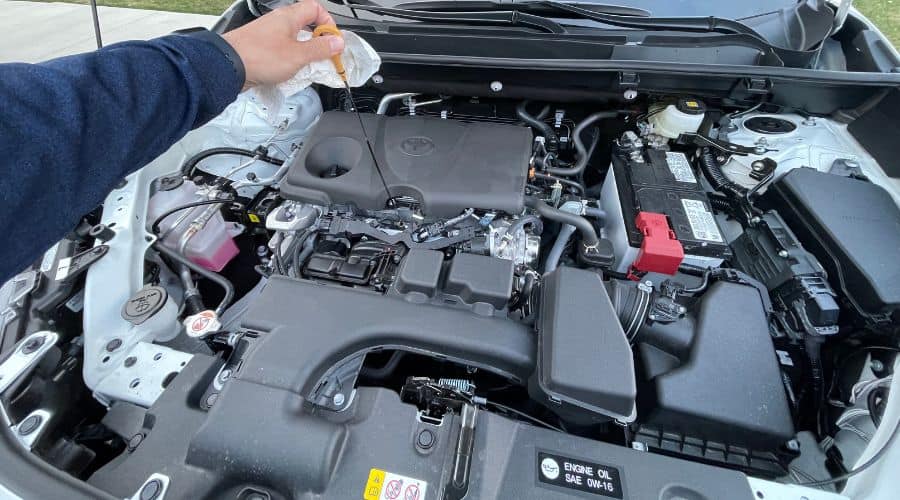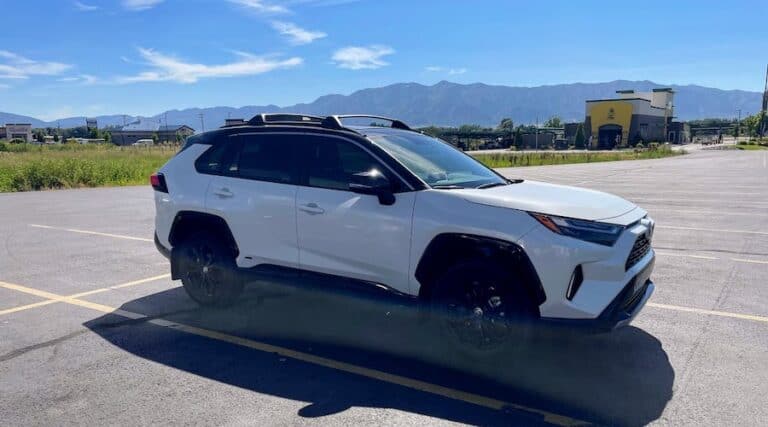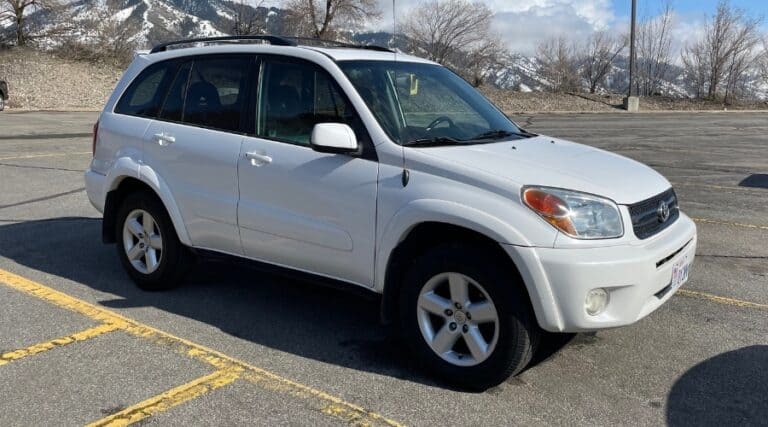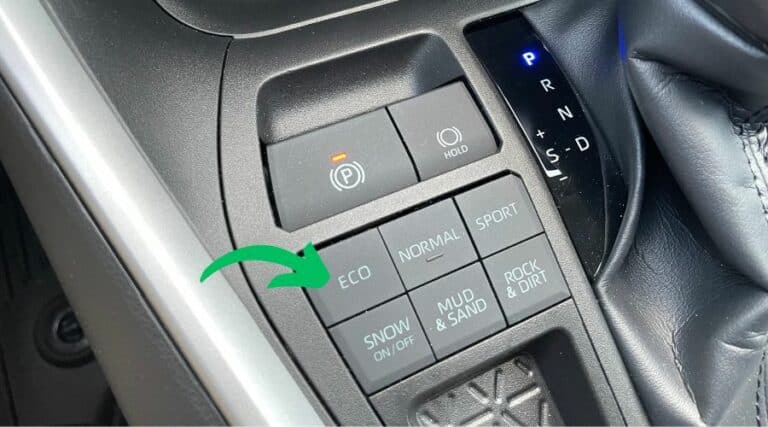5 Common Toyota RAV4 Problems: An Owners & Buyers Guide
Considering “common Toyota RAV4 problems” is important especially when you’re a proud owner or considering becoming one. After all, the RAV4 is known for its reliability and performance. But like any vehicle, it has its quirks. So, what are the biggest problems with the Toyota RAV4?
The most common Toyota RAV4 problems reported by owners include EVAP system issues, catalytic converter failure, transmission problems, excessive oil consumption, and steering problems. However, it’s important to remember that these issues do not detract from the overall reliability and performance that the RAV4 is known for.
Despite these common problems, it’s crucial to remember that the Toyota RAV4 has a longstanding reputation as a reliable SUV. Even the most dependable vehicles, such as the RAV4, can encounter issues but with proper care and maintenance, it’s a vehicle that’s built to last.
- Is the Toyota RAV4 considered a reliable SUV?
- Problem 1: EVAP System Issues
- Problem 2: Catalytic Converter Failure
- Problem 3: Transmission Problems
- Problem 4: Excessive Oil Consumption
- Problem 5: Steering Problems
- Year-Specific Problems
- Understanding Vehicle Recalls
- Preventive Measures and Regular Maintenance
- Frequently Asked Questions
Curious about your RAV4’s fuel efficiency? We’ve got you covered!
- Want the numbers? Check out our RAV4 MPG calculator for city, highway, and combined mileage for any year and trim.
- Looking for real-world insights? See real-world RAV4 gas mileage data from fellow RAV4 owners and how far your RAV4 can take you on a full tank of gas.
- Ready to estimate your weekly gas costs? Dive into our Toyota RAV4 Fuel Consumption Calculator: Estimate Gas Costs and take control of your fuel budget!
Is the Toyota RAV4 considered a reliable SUV?
Before diving into the reported issues and problems it is important to consider the RAV4’s overall reliability ratings. Ever since its USA debut in 1996, the Toyota RAV4 has been considered a good, reliable SUV.
Why is the Toyota RAV4 so popular? See 9 reasons why it is the most popular SUV in America.
Here are the reliability ratings of the Toyota RAV4 by generation:
- First Generation (1996-2000): The first-generation RAV4 is reliable, reporting about 60 or fewer complaints on NHTSA each year.
- Second Generation (2001-2005): The second-generation RAV4 received over 500 complaints for each model year, according to the NHTSA.
- Third Generation (2006-2012): The third-generation RAV4 managed to get even more reliable than the previous generation with an average of about 140 complaints per model year.
- Fourth Generation (2013-2018): The fourth-generation RAV4 has the most model years with a 5/5 reliability score from Consumer Reports, and its pioneer 2013 model year was among the recipients. Consumer Reports gave the 2018 Toyota RAV4 a 5/5 overall reliability rating and the 1 spot in SUV reliability for the year.
- Fifth Generation (2019-present): The Toyota RAV4 has a reliability score of 4.0 out of 5.0, according to RepairPal.
Overall, the Toyota RAV4 has a good reputation for reliability, with all model years receiving above-average ratings. While some model years have reported issues, the RAV4 is still considered a reliable SUV.
What Camp Trailers Can a Toyota RAV4 Tow? See a full guide on trailers that can be towed by a RAV4.
Problem 1: EVAP System Issues
The EVAP system, or the Evaporative Emission Control System, is a crucial part of your Toyota RAV4. It’s like the vehicle’s respiratory system, ensuring that harmful vapors from your car’s fuel don’t escape into the atmosphere. However, like a persistent cough can indicate a problem with our lungs, certain signs can point to issues with the EVAP system.
Understanding the EVAP System
The EVAP system is designed to capture and store fuel vapors before they can escape into the environment. When working correctly, it’s a silent hero, protecting both your vehicle and the environment. But when things go wrong, it can lead to a series of problems.
Common EVAP System Problems in Toyota RAV4
One of the most common EVAP system problems in the Toyota RAV4 is the failure of the EVAP canister. This canister is like a storage vault for fuel vapors, and when it fails, it can trigger the check engine light.
Signs of EVAP Canister Failure
The most obvious sign of an EVAP canister failure is the check engine light. However, you might also notice a fuel smell, especially after refueling. It’s like when you’re at the gas station, and you get that whiff of gasoline – except now, it’s coming from your car.
Two ways to identify if your EVAP canister has failed in your RAV4 include:
- Check engine light comes on (codes P0455 or P0456)
- A fuel smell coming from your car after refueling
When a Toyota RAV4 has EVAP (evaporative emission) problems, it may trigger the following check engine codes:
- P0455: This code indicates a large leak in the EVAP system.
- P0456: This code indicates a small leak in the EVAP system.
- Other EVAP system faults can also trigger the check engine light, which may be difficult to diagnose without proper testing and equipment.
If you encounter any of these codes or suspect EVAP system problems in your Toyota RAV4,we recommend you have the vehicle diagnosed by a qualified mechanic to determine the exact cause and necessary repairs.
How to Address EVAP System Issues
If you suspect an issue with your EVAP system, the best course of action is to have your vehicle inspected by a professional. They can diagnose the problem and recommend the necessary repairs.
Remember, addressing these issues early can save you from more expensive repairs down the line.
Cost to Fix RAV4 EVAP System
The cost to fix EVAP (evaporative emission) issues in a Toyota RAV4 can vary depending on various factors such as the model year, location, labor rates, and the extent of the problem. Here is an approximate cost range:
- The cost for EVAP system repair for a 2018 Toyota RAV4 ranges between $200 and $560, with labor costs ranging between $35 and $140.
- According to CopilotSearch, the cost to fix a check engine light due to a faulty EVAP vapor canister in a 2016 Toyota RAV4 is about $390-$400, with parts costing around $300 and labor costing around $90.
- RepairPal mentions that replacing the EVAP canister to correct EVAP system problems in a Toyota RAV4 can cost between $190 and $240, with labor costs ranging between $70 and $90
These are just estimates and can vary based on specific circumstances so you should find a trusted mechanic for an accurate estimate.
While EVAP system issues can be a problem with the Toyota RAV4, they’re also manageable. With regular maintenance and prompt attention to any warning signs, you can keep your RAV4 running smoothly and efficiently.
Do you want to reduce the road noise in your RAV4? See the top 5 quietest tires for Toyota RAV4.
Problem 2: Catalytic Converter Failure
The catalytic converter is a silent guardian of both your Toyota RAV4 and the environment. It’s like a filter for your vehicle’s exhaust system, transforming harmful gasses into less harmful substances before they exit your car’s tailpipe. However, when the catalytic converter starts to fail, it can lead to a series of problems.
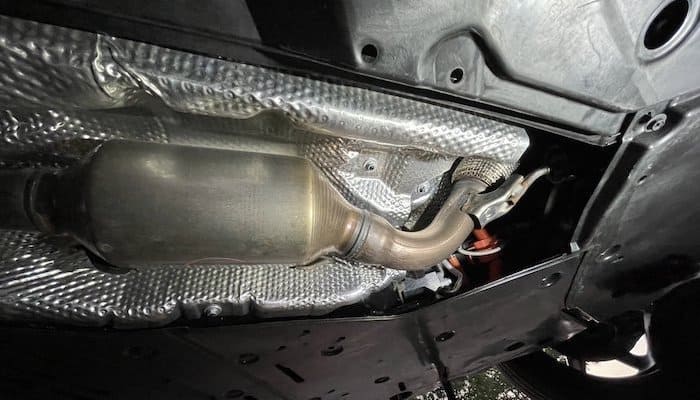
Understanding the Catalytic Converter
The catalytic converter is a key component of your vehicle’s exhaust system. It’s designed to reduce harmful emissions by converting them into harmless gasses. When working correctly, it helps your RAV4 run smoothly while minimizing its environmental impact. But when things go wrong, it can affect your vehicle’s performance and emissions.
Common Catalytic Converter Problems in Toyota RAV4
One of the most common catalytic converter problems in the Toyota RAV4 is premature failure. This can lead to the following issues in your RAV4:
- Reduced performance
- Increased emissions
- Failed emissions test
Is the RAV4 easy to steal? See how to protect your RAV4 from theft.
Signs of Catalytic Converter Failure
The most obvious sign of a catalytic converter failure is the check engine light. However, you might also notice a decrease in your vehicle’s performance or fuel efficiency.
Two ways to identify if your catalytic converter has failed in your RAV4 include:
- Check engine light comes on (code P0420)
- Noticeable decrease in vehicle performance or fuel efficiency
When a Toyota RAV4 has catalytic converter problems, it may trigger the following check engine code:
- P0420: This code indicates a potential issue with the operating efficiency of the catalytic converter.
It is important to note that the P0420 code can have multiple potential causes, and catalytic converter failure is one of them. Other factors, such as faulty oxygen sensors or exhaust leaks, can also trigger this code. If you encounter a P0420 code or suspect catalytic converter problems in your Toyota RAV4, it is recommended to have the vehicle diagnosed by a qualified mechanic to determine the exact cause and necessary repairs.
How to Address Catalytic Converter Issues
If you suspect an issue with your catalytic converter, the best course of action is to have your vehicle inspected by a professional mechanic. They can diagnose the problem and recommend the necessary repairs.
However, one thing you can try at home is using a catalytic converter cleaning product.
Catalytic Converter Cleaner Products: There are catalytic converter cleaner products available on the market that can be used to clean the converter without removing it from the vehicle. These products are typically added to the fuel tank during a regular refueling. Examples of such products include Solder-It (CAT-1) Catalytic Converter Cleaner, Cataclean, and OXICAT.
Remember, addressing these issues early can save you from more expensive repairs down the line.
Cost to Fix RAV4 Catalytic Converter
The cost to fix catalytic converter issues in a Toyota RAV4 can vary depending on various factors such as the model year, location, labor rates, and the extent of the problem. Here is an approximate cost range based on the search results:
- The average cost for a Toyota RAV4 catalytic converter replacement in the United States is estimated to be between $879 and $923.
- Aftermarket Toyota RAV4 catalytic converters can start from as little as $237.99.
- The cost of a Toyota RAV4 catalytic converter replacement can range between $500 and $3000 in Australia.
- According to a user on the Jerry community forum, the estimated cost to replace a Toyota RAV4 catalytic converter in 2023 was around $1,300.
- The cost of a catalytic converter for a Toyota RAV4 can be found for as low as $121 from aftermarket suppliers.
- A user on the RAV4World forum mentioned that they found a catalytic converter for their RAV4 online for $363.37, while a repair shop quoted them $1,300 for the replacement.
It is important to note that these are approximate cost ranges and can vary depending on the specific circumstances. It is recommended to consult with a trusted mechanic or repair shop to get an accurate estimate for your specific situation.
What is the correct tire pressure for a Toyota RAV4? See our RAV4 tire pressure guide.
Problem 3: Transmission Problems
The transmission of your Toyota RAV4 is like the vehicle’s central nervous system, controlling the power from the engine to the wheels. It ensures smooth acceleration and efficient driving. However, when transmission problems arise, it can affect your vehicle’s performance and driving experience.
Understanding the Toyota RAV4 Transmission
The transmission is a complex component of your vehicle that regulates power from the engine to the drive wheels. When working correctly, it ensures smooth gear changes and optimal fuel efficiency. But when things go wrong, it can lead to a series of problems.
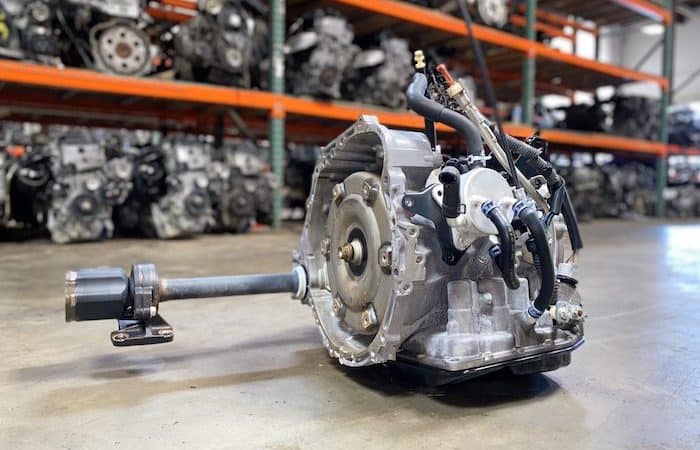
Common Transmission Problems in Toyota RAV4
One of the most common transmission problems in the Toyota RAV4 is harsh or delayed shifting. This can lead to a less-than-smooth driving experience and, in severe cases, can even lead to transmission failure.
Transmission problems are more common in older RAV4s especially in those that haven’t received regular preventative maintenance and care.
Signs of Transmission Problems
The most obvious sign of a transmission problem is if your RAV4 is having difficulty shifting gears or if you notice a delay in acceleration. It’s like when you’re trying to change lanes on a busy highway, but your car isn’t responding as quickly as it should.
Two ways to identify if your transmission has problems in your RAV4 include:
- Difficulty or delay in shifting gears
- Noticeable delay in vehicle acceleration
There is no specific check engine code that a Toyota RAV4 will pull when it has transmission problems. However, the following codes may be related to RAV4 transmission problems:
- P0771: Shift Solenoid ‘E’ Performance or Stuck Off
- P0776: Pressure Control Solenoid ‘B’
- Other transmission-related codes may also be present, depending on the specific issue
It is important to note that codes from a check engine light should be treated as just one part of a complete diagnostic process, and a qualified mechanic should perform a thorough diagnosis to determine the exact cause of the problem.
How to Address Transmission Issues
If you suspect an issue with your transmission, the best course of action is to have your vehicle inspected by a professional. They can diagnose the problem and recommend the necessary repairs.
Remember, addressing these issues early can save you from more expensive repairs down the line.
One of the best things you can do to keep your transmission working properly is regular preventative maintenance (see a complete RAV4 maintenance schedule).
Cost to Fix RAV4 Transmission
The cost to repair or replace a transmission in a Toyota RAV4 can vary depending on various factors such as the model year, location, labor rates, and the extent of the problem. Here is an approximate cost range:
- A Toyota RAV4 transmission replacement can range from $1,500 to $6,000, according to GetJerry.
- According to Kelley Blue Book (KBB), the cost of transmission repair and replacement for a 2018 Toyota RAV4 ranges from $5,825 to $6,259, including parts and labor.
- The cost of a new Toyota RAV4 transmission could be over $3,500 depending on the vehicle, according to Toyota of Union City.
- The average cost for a Toyota RAV4 transmission rebuild is $3,377, according to RepairSmith.
- The cost of a new 2022 Toyota RAV4 transmission could be over $3,500 depending on the car, according to Bill Estes Toyota.
While transmission issues can be a problem with the Toyota RAV4, overall it is still a rare occurrence. With regular maintenance and prompt attention to any warning signs, you can keep your RAV4 running smoothly and efficiently.
How can you get better gas mileage in your RAV4? See how to increase gas mileage in your RAV4 (tips that work).
Problem 4: Excessive Oil Consumption
Oil is the lifeblood of your Toyota RAV4, ensuring that everything runs smoothly under the hood. However, when your vehicle starts consuming oil faster than a marathon runner drinks water, it’s a sign that something might be amiss.

Understanding Oil Consumption in Your Toyota RAV4
Every vehicle consumes oil to some extent. It’s a normal part of the engine’s operation, helping to lubricate moving parts, cool the engine, and prevent corrosion. However, excessive oil consumption can be a sign of a problem and should not be overlooked.
Common Oil Consumption Problems in Toyota RAV4
Excessive oil consumption is a problem that has been reported by some Toyota RAV4 owners, particularly in older models. This can lead to low oil levels, which can cause engine damage if not addressed promptly.
Signs of Excessive Oil Consumption
The most obvious sign of excessive oil consumption is having to top up your oil frequently between regular oil changes. It’s like when you’re on a road trip and you find yourself stopping for gas far more often than you expected.
Two ways to identify if your RAV4 has an oil consumption problem include:
- Needing to add oil frequently between regular oil changes
- Noticeable smoke from the exhaust
How to Address Excessive Oil Consumption
If you suspect your RAV4 is consuming oil excessively, the best course of action is to have your vehicle inspected by a professional mechanic. They can diagnose the problem and recommend the necessary repairs.
I remember a friend who owned a RAV4 and noticed that he was topping up the oil more frequently than usual. Instead of ignoring the problem, he took his RAV4 to a trusted mechanic who was able to diagnose and fix the issue by replacing the PCV valve, saving him from potential engine damage down the line.
How to Prevent Excessive Oil Consumption in a RAV4
Preventing excessive oil consumption in your RAV4 largely comes down to regular maintenance and prompt attention to any warning signs. Here are a few tips:
- Regular Oil Changes: Stick to the recommended oil change schedule for your RAV4. Regular oil changes not only replenish the oil but also allow a mechanic to inspect your vehicle and spot any potential issues early.
- Use the Right Oil: Always use the type of oil recommended by Toyota for your specific RAV4 model. Using the wrong type of oil can lead to increased oil consumption.
- Monitor Oil Levels: Regularly check your oil levels using the dipstick. If you notice the level dropping faster than usual, it’s time to have your vehicle inspected.
- Pay Attention to Warning Signs: If you notice smoke from the exhaust or have to top up your oil frequently, don’t ignore these signs. These could be indications of excessive oil consumption.
Remember, the key to preventing excessive oil consumption, and many other vehicle issues, is regular maintenance and early detection. Make sure to watch for the maintenance required light to come on. See RAV4 maintenance required light meaning & how to reset.
Cost to Fix Excessive Oil Consumption in RAV4
The cost to fix excessive oil consumption can vary widely depending on the root cause of the problem and the labor rates in your area. It’s always a good idea to get an estimate from a trusted mechanic or repair shop for the most accurate information.
While excessive oil consumption can be a problem with the Toyota RAV4, it’s also manageable. With regular maintenance and prompt attention to any warning signs, you can keep your RAV4 running smoothly and efficiently.
Interested in Changing the oil in your RAV4 yourself? See a step-by-step guide on how to change oil in a RAV4 and everything you’ll need.
Problem 5: Steering Problems
Steering your Toyota RAV4 should be as smooth and effortless as gliding on ice. However, when steering problems arise, it can feel more like wrestling with a stubborn mule. It’s not just frustrating – it can also be a safety concern.

Understanding Steering in Your Toyota RAV4
The steering system of your RAV4 is designed to offer precise control and responsiveness. When working correctly, it ensures a smooth and comfortable driving experience. But when things go wrong, it can affect your vehicle’s handling and safety.
Common Steering Problems in Toyota RAV4
Some Toyota RAV4 owners have reported issues with the steering system including:
- Difficulty turning the steering wheel
- Noisy steering wheel
These problems can range from minor annoyances to major safety issues.
Signs of Steering Problems
The most obvious sign of a steering problem is a change in your vehicle’s handling. You might notice that your RAV4 is harder to steer, or you might hear unusual noises when turning the wheel.
Three ways to identify if your RAV4 has a steering problem include:
- Difficulty turning the steering wheel
- Unusual noises when turning the wheel
- In 2006 and new RAV4s that use electric power steering (EPS) a warning light will come on
How to Address Steering Issues
If you notice any changes in your vehicle’s steering behavior, don’t ignore them. Have your vehicle inspected by a professional to ensure your safety on the road.
If you drive a 2005 or older RAV4 you can check the power steering fluid to make sure it is at appropriate levels.
For 2006 and new RAV4s that use an electric power steering (EPS) you can check for a weak battery or water damage from a leak.

I recall a time when a neighbor mentioned that her RAV4 was making a strange noise when she turned the wheel. She took it to a mechanic right away, and they discovered a problem with her steering system. Because she acted quickly, they were able to fix the issue before it became a major problem.
A regular maintenance task that will extend the life of your tires is rotating them every time you change the oil. When doing so you’ll need to know the RAV4’s lug nut torque specs.
Year-Specific Problems
Just like fine wine, cars can have good years and not-so-good years. Even within the same model, like the Toyota RAV4, certain years can be more prone to specific problems than others. It’s important to be aware of these year-specific issues when buying a used RAV4 or diagnosing problems in your current vehicle.
Common Problems in 2019 Toyota RAV4
The 2019 Toyota RAV4, while generally well-received, has had some reported issues. Some owners have reported transmission problems, particularly with harsh or delayed shifting.
Common Problems in 2020 Toyota RAV4
For the 2020 Toyota RAV4, some owners have reported issues with the vehicle’s infotainment system. While not a mechanical issue, it can still be frustrating when your favorite song suddenly cuts out in the middle of a road trip.
Want to know how much cargo space the RAV4 has? See a detailed breakdown of the RAV4 cargo space and dimensions with photos.
Common Problems in 2021 Toyota RAV4
The 2021 Toyota RAV4 is a relatively new model, and as such, there are fewer reported issues. However, some owners have reported minor issues with the vehicle’s interior quality.
How to Address Year-Specific Issues
If you’re experiencing a problem that seems to be common with your RAV4’s specific model year, it’s a good idea to first check for any Toyota recalls. Then have it checked out by a professional. They can confirm whether it’s a known issue and recommend the best course of action.
Remember, even if your vehicle’s model year is known for certain problems, it doesn’t mean you’ll necessarily experience them. Regular maintenance and prompt attention to any issues can help keep your RAV4 running smoothly.
What size of tires fit your RAV4? Find the correct tires size for your Toyota RAV4.
Understanding Vehicle Recalls
Vehicle recalls are like a safety net for car owners. They ensure that if a manufacturer discovers a defect that affects safety, they’ll take responsibility to fix it.

What is a Vehicle Recall?
A vehicle recall is issued when a manufacturer identifies a defect in a model that could potentially affect the safety of the vehicle. Additionally, the manufacturer will provide a fix to the vehicle at NO cost to the consumer.
How Do I Know if My RAV4 Has a Recall?
If your RAV4 is subject to a recall, you should receive a notice directly from Toyota. However, you can also check the National Highway Traffic Safety Administration’s (NHTSA) recall database.
What Should I Do If My Vehicle Has a Recall?
If your RAV4 has a recall, don’t panic. The first step is to contact your local Toyota dealership. They can confirm the recall and guide you through the process of getting the issue fixed.
I remember a customer who received a recall notice for her RAV4. She was initially worried, but after contacting her dealership, she was able to get the issue resolved quickly and at no cost to her.
Are Recalls a Bad Sign?
While no one likes to hear that their vehicle has a recall, it’s not necessarily a bad sign. In fact, recalls show that the manufacturer is proactive about safety and is willing to take responsibility for any issues.
While vehicle recalls can be concerning, they’re a part of owning a vehicle. By understanding what they are and how to handle them, you can ensure that your RAV4 remains safe and reliable.
Is the Toyota RAV4 a good family Car? See 9 compelling reasons why the Toyota RAV4 is a good family car.
Preventive Measures and Regular Maintenance
Giving your Toyota RAV4 regular attention and care can keep it running smoothly and looking great. Let’s explore some preventive measures and regular maintenance tips to help your RAV4 stay in top shape.
Regular Oil Changes
Regular oil changes are the bread and butter of car maintenance. They keep your engine running smoothly and can help prevent excessive oil consumption. It’s like staying hydrated on a hot day – it keeps everything running smoothly.
Regular Check-ups
Just like you go to the doctor for regular check-ups, your RAV4 needs regular inspections. A professional can spot potential issues before they become major problems and ensure that everything is working as it should.
Pay Attention to Warning Signs
If your RAV4 starts behaving differently – whether it’s a strange noise, a warning light, or a change in performance – don’t ignore it. It’s like when your body starts showing signs of illness – it’s important to get it checked out.
I recall a customer who came in because his RAV4 was making a strange noise. It turned out to be a minor issue, but because he came in as soon as he noticed the problem, we were able to fix it before it became a major repair.
Use Genuine Toyota Parts
When it comes to parts, it’s always best to use genuine Toyota parts. They’re designed to work perfectly with your RAV4, ensuring optimal performance and longevity. It’s like using the right type of fuel for your car – it just runs better.
Keep it Clean
Keeping your RAV4 clean isn’t just about aesthetics – it can also help prevent issues. For example, a clean engine is easier to work on and can help spot leaks or other problems.
Frequently Asked Questions
Yes, the RAV4 has been labeled by consumer reports and Repair Pal as a reliable car. While every vehicle can have its issues, the Toyota RAV4 is known for its reliability and longevity. Regular maintenance and attention to any warning signs can help ensure your RAV4 stays on the road for many years.
While it can vary by model year, some of the most commonly reported problems with the Toyota RAV4 include EVAP system issues, catalytic converter failure, and transmission problems. However, these issues are not universal and many RAV4 owners experience trouble-free ownership.
The cost to fix common RAV4 problems can vary widely depending on the exact nature of the problem, the cost of parts, and labor rates in your area. The cost to fix a RAV4 can range anywhere from less than $100 to more than $1,000. It’s always a good idea to get an estimate from a trusted mechanic or repair shop for the most accurate information.
Regular maintenance is key to preventing common RAV4 problems. This includes regular oil changes, paying attention to warning signs, using genuine Toyota parts, and keeping your vehicle clean.
If your RAV4 has a recall, the first step is to contact your local Toyota dealership. They can confirm the recall and guide you through the process of getting the issue fixed.

